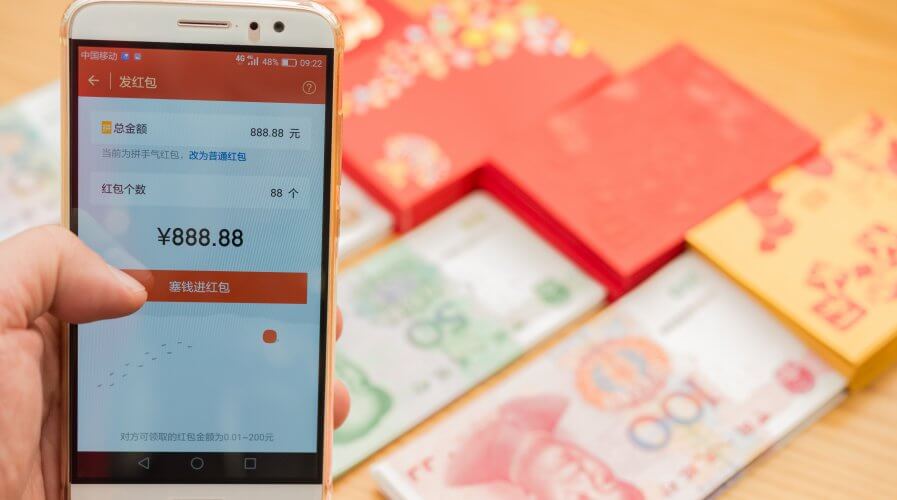
Facebook could be trialling a P2P system that mimics WeChat’s popular option. Source: Shutterstock
Could Facebook be mimicking WeChat’s ‘red envelope’ P2P system?
FACEBOOK, a hub for many e-commerce operators, may finally be entering the payments space with a peer-to-peer (P2P) model that looks suspiciously like a model inspired by China’s hit messaging service, WeChat.
As reported by eMarketer, the social media platform was spotted to be testing out a “red envelope” payment system that would allow users to send money to each other. Red envelopes are an essential part of Chinese cultures as a way of passing cash gifts among family and friends, usually during the Lunar New Year holiday, but also during significant events like weddings and birthdays.
WeChat, the social messaging platform created by tech giant Tencent, began offering digital red envelopes – also known as “hongbao” in Mandarin – with which users could send real money, in order to drive up the adoption of its WeChat Pay service. eMarketer said that WeChat has been used to send 46 billion digital envelopes during the past New Year celebrations.
Facebook’s adoption of the technology was first spotted by The Next Web’s Matt Navarra, who tweeted a screencap. Recode later reported that the social media giant had confirmed that they were considering a future test of the system.
NEW: Facebook is testing a ‘Red Envelope’ feature to send cash gifts to friends pic.twitter.com/GsADKlKjqH
— Matt Navarra ⭐️ (@MattNavarra) November 3, 2017
The introduction of the red envelopes marks the very first evidence of Facebook’s potential future to up its relevance in the e-commerce space. Today, thousands of merchants make a living off the social media platform’s “shop” feature, though payment systems have traditionally been outsourced to third-party services, or through more manual processes like bank transfers. A dedicated Facebook P2P system could have an outsized impact on how business is run on the platform.
The platform already allows Messenger app users to make P2P payments, but that hasn’t yet been extended to the desktop or mobile platform. This isn’t surprising though, as the majority of Western companies lag far behind China in terms adopting P2P payment models.

Red packets are a cultural staple in Chinese society, used to passing cash gifts to family and friends. Source: Shutterstock
According to estimates by eMarketer, only around 31 percent of US adult smartphone users will actually use P2P services.
However, the adoption of the WeChat-like model is a bit odd, considering the fact that red envelopes are culturally alien outside Asia, not to mention the fact that it’s unlikely anyone in China will use it since the platform is blocked there.
But in the bigger picture, it’s a sign that Facebook has seen the success of WeChat in the China space, and it’s copycatting as much as it can to draw similar audience sizes, as well as potentially find a way to re-enter the country’s digital space.
Facebook’s Mark Zuckerberg has been courting Chinese officials in earnest as the platform looks for a way to leave the exile it’s been consigned to since 2009. By bringing onboard more familiar, appealing services, the platform could be capitulating to Chinese demands in order to access Chinese markets.
Other than that, the company has made no secret of its desire to be the everything-platform-for-everyone. A P2P payment system could bring consumers and audiences further into its ecosystem, which means more eyeballs which means more advertising dollars, the company’s bread and butter.
READ MORE
- Strategies for Democratizing GenAI
- The criticality of endpoint management in cybersecurity and operations
- Ethical AI: The renewed importance of safeguarding data and customer privacy in Generative AI applications
- How Japan balances AI-driven opportunities with cybersecurity needs
- Deploying SASE: Benchmarking your approach


